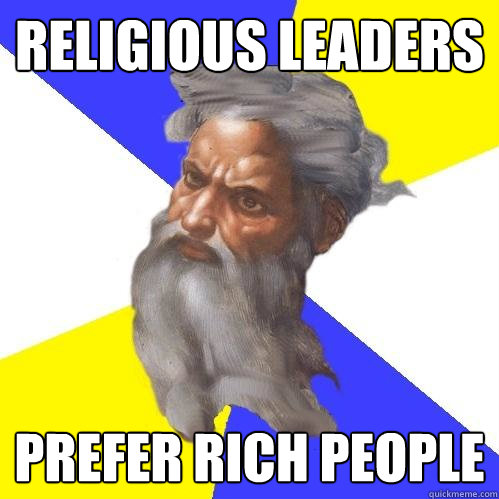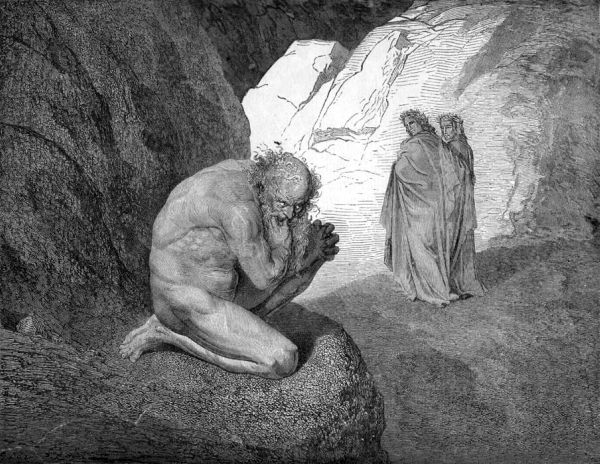Looking at him,
Jesus felt a love for him and said to him, "One thing you lack: go and
sell all you possess and give to the poor, and you will have treasure in
heaven; and come, follow Me." But at these words he was saddened, and he
went away grieving, for he was one who owned much property.
And Jesus, looking around, said to His
disciples, "How hard it will be for those who are wealthy to enter the kingdom of God!" The disciples were amazed at
His words. But Jesus answered again and said to them, "Children, how hard
it is to enter the kingdom
of God! It is easier for
a camel to go through the eye of a needle than for a rich man to enter the kingdom of God."
A
conversation between an ancient Hebrew prophet and a Hebrew seeker
Scene: A cave at the top of a Himalayan peak. Fog drifts across part of the snow-covered
mountain behind it. Before the cave is a
ledge which drops down to unknown depths.
A SWAMI , who looks remarkably like Jesus, is sitting, cross-legged at
the opening of the cave, his eyes closed.
A few of his disciples—PETER and JOHN sit behind him, trying to be
cross-legged as well, but having difficulty mastering the position. As they scuffle and fight with each other,
the SWAMI sits in perfect peace, ignoring their difficulties.
A young
YUPPIE appears, climbing up the ledge.
He is dressed in a three-piece stylish business suit, clearly very
expensive, black shoes shined and the owner of a three-hundred dollar haircut. He is carrying a cell phone and a briefcase. He struggles up the ledge, throwing his
briefcase up first, then finally climbing up the ledge. Exhausted, he crawls over to the SWAMI and
collapses. The SWAMI doesn’t move a
muscle, but PETER and JOHN stare at the man, shocked.
YUPPIE: (Breathing
hard) Oh Great… and Knowledgeable…
Good… and Holy Swami! I have traveled
over many days and suffered many travails…
SWAMI: (Not
yet opening his eyes. Speaking in a
bored voice.) Who are you trying to impress?
YUPPIE:
But Good Swami, I have traveled thousands of miles….
SWAMI: In
your private jet plane, flying into Kathmandu.
YUPPIE: And I climbed this mountain…
SWAMI: The
rented helicopter dropped you off on the ledge over there.
YUPPIE:
Look, Good Swami, I came all the way from the United States to talk to you, and
the least you could do is listen!
SWAMI: (Opens
one eye) There is no one good but God.
If you want to address me, “hey you” will do. (Closes
his eye)
YUPPIE: (Taken aback) But Swa…
But I have come this way to ask you a question.
SWAMI:
Just one?
YUPPIE:
Yes, just one.
SWAMI: I’ll try to fit it into my schedule.
(Silence for a moment)
YUPPIE:
Can I ask?
SWAMI: (Sighs and opens his eyes.) Shoot. Try your best.
YUPPIE:
Great Swami…
SWAMI: Get
to the point, okay?
YUPPIE: (Wind taken out of his sails.) Um,
okay. How can I obtain eternal life?
SWAMI:
Eternal life?
YUPPIE:
Yes.
SWAMI:
Life with God?
YUPPIE:
Yes.
SWAMI:
Resurrection from the dead?
YUPPIE:
Yes…
SWAMI:
Inheritance in God’s kingdom?
YUPPIE:
Yes!
SWAMI: Peace, security and every good thing?
YUPPIE:
Yes, yes, YES!
SWAMI: Have you gone to others to ask them this question?
YUPPIE:
Yes, I have gone to a thousand teachers, a hundred professors, a dozen
philosophers and a faith healer.
SWAMI: And
what did they tell you?
YUPPIE:
They told me to obey the commandments.
SWAMI: The
commandments of God, eh? What
commandments did they mention?
YUPPIE:
The usual. Don’t murder, don’t steal,
don’t commit adultery, don’t cheat, honor your father and mother. You know, the normal list everyone gives.
SWAMI:
Sounds good. Go for it. (Closes
his eyes again.)
YUPPIE: (Exasperated) But… but. (Explodes)
IS THAT IT?! (SWAMI doesn’t respond.) That
can’t be it! I’ve been doing that all my
life! It’s just too easy. I know there must be something more. Swami, isn’t there? (SWAMI
opens his eyes.) Please, Swami,
isn’t there something you haven’t been telling me? I just feel that something is missing. In obeying the commands, I still seem so distant from God. Isn't there something else?
SWAMI: (Has new respect for YUPPIE, and looks at him
intently.) If you want to be sure of
your salvation, then listen carefully: (YUPPIE
leans in to listen) Take your cell phone, and your computers and your plane
and your house—sorry, houses— and your stocks and sell it all. Turn it into hard, cold cash. Then, give it away to all the beggars in your
home town. Then come back and follow
me. (Closes
his eyes.)
YUPPIE: (Eyes downcast) Um, Swami?
SWAMI: (Calmly) Yes?
YUPPIE:
How can I follow you?
SWAMI: (An eyebrow goes up.) What do you mean?
YUPPIE: I
mean… well… you aren’t, uh, going anywhere.
SWAMI: Oh,
that. Well, I’ll be travelling down to Kathmandu.
YUPPIE:
Ah.
SWAMI: And
my disciples will follow me.
YUPPIE: I
see.
SWAMI: And
I’ll be killed there, you see. (PETER and
JOHN jump up, eyes wide.)
YUPPIE:
Yes, yes, that’s fine. Just
wondering. I do have just a couple more
questions.
SWAMI: (Opening both eyes, slightly irritated.) You know, you said that you would just ask me
one question and I have been so gracious as to answer three. And now you are demanding more? You are becoming annoying.
YUPPIE: I
just need a couple things clarified.
SWAMI: I don’t see how much more clear I can make
it. Here, try this for size: Sell your possessions and give to the poor,
then come and follow me.
YUPPIE: I
think I got the gist of that, but I was just wondering… just to clarify…
SWAMI:
Yes, what is it?
YUPPIE:
Well, perhaps I could just keep the physical things, but not be overly attached
to them. You know, like share them with
others—my friends perhaps. And I won’t
worry so much if I lose them.
SWAMI: (Irritated)
Which part of “Sell your possessions” did you not understand? That should be clear, I think. If you really want to not be “overly
attached” to your possessions, there’s only one solution—get rid of them. That should do it, I think.
YUPPIE:
But I worked hard for these possessions!
I made the right decisions, I struggled to get where I am. Why should I give my own stuff to anyone?
SWAMI: You
worked, yes. But the wealth you received
came from God. Others work just as hard
as you, and harder, but do not have as much as you do. Your wealth is a gift. A loan, actually, and God is seeing what you
will do with what you have received. And
God’s command is this: “Stop spending your excess wealth on yourself and those
who love you. Give it to the poor, and I
will take that wealth and give it back to you a hundredfold in the final
day.”
YUPPIE:
But the poor! They don’t deserve that
money! They’ll just waste it all on
drugs and alcohol…
SWAMI:
While you waste it on real estate and stock speculations. No difference, really. Besides, how many poor do you really
know?
YUPPIE:
Well, I see the guys holding signs on the streets…
SWAMI: How
many of them have you met? Even talked
to?
YUPPIE: I
talked to some of them…
SWAMI: And
how many of them did you listen to? How
many of them did you take the time to hear their stories, to find out who they
really are? How many of them did you
spend a day with to see their normal activities? How do you know what they would do with the
money if they had it?
YUPPIE: Well, statistically…
SWAMI:
Statistically! Means and averages are
the idols of the modern age—that which we hide behind to avoid doing what is
right. If you want to know who someone
is, plug them into a category, and suddenly you know their whole life story,
thanks to the modern miracle of Probability!
No one exists until they are a blip on the National Per Capita
Production chart! No one has a need
until their needs are polled, assumed, measured and churned out on the meat
grinder of reality! What does any of
that have to do with real life? What
does it have to do with real people? The next time you walk your street, look
at the man collapsed in the alley north of you.
He does drink, but his dream is to own a truck and tools in order to
have a landscaping business. He already
has a couple customers to prove his ability, but he just needs a hand up and he
will have a whole new life. You know
that filthy girl who you ran into downtown last year, whom you assumed was drunk or
high? Actually, she has a medication
which she cannot afford, which makes her well, if not completely
independent. She has never had more than
a beer her whole life, and has never taken illegal drugs. Everyone just assumes she had because she
hangs out silently in AA meetings for the warmth and coffee in the
morning. If you worship statistics so
much, here is one—no more than 50 percent of the homeless people in your town
are regular users of alcohol or illegal drugs.
And yet you want to reject the whole lot of them, to ignore God’s commands,
to throw away your salvation—why?
Because of your assumption.
Because of your judgment.
YUPPIE: (Shamefaced) I don’t know what to say…
SWAMI: (Outraged.) Say nothing!
You came all this way to find out the truth. And in finding the truth, you throw it back
in my face. Accept simply this: “Sell
your possessions and give to the poor.
Then come and follow me.” That’s
your answer. Take it or leave it.
YUPPIE: (Silently, reluctantly, picks up briefcase
and carries it and himself over the ledge again.)
(There is a brief silence as PETER and JOHN
get over their shock at the statements of their teacher. This also allows us to pause before the
conclusion of our short play. It’s good to take a break from the action for a
moment, isn’t it?)
PETER: Master, weren’t you hard on him?
SWAMI: It may
seem so, but I was doing him a favor. He
is a good kid.
JOHN: You
didn’t make him sound so good.
PETER:
Yeah, you told him off.
SWAMI: (Smiles)
I was treating him as a disciple. Didn’t
you recognize my tone? If he was going
to break with the wealth that was choking away his life, he would have to have
a wake-up call.
PETER: You
certainly treated him a lot harsher than you did us.
SWAMI: Do
you realize how difficult it is for a wealthy person to have eternal life? It is impossible.
PETER:
What do you mean? Impossible? But the wealthy have the leisure to study
righteousness. The wealthy have the
leisure to pray when they want. The
wealthy can give huge amounts to the needy.
SWAMI: You do not understand them, do you? Yes, they have the opportunity, but they
don’t take them. The wealthy allow their
wealth to take over their whole lives.
They could pray, but they look to the caring of their riches, instead,
for in that they find their salvation.
They could study righteousness, but they study the texts that assist
them in increasing their wealth. They
could give to the poor, but they have become so attached to their wealth, that
they dare not part from it. Their wealth
becomes their god. Wealth is their
security, the source of their pleasure, the basis of their health and
well-being, the means of living in their society. The only way for them to truly be obedient to
God is to get rid of it and give it to God’s program of assisting the poor.
JOHN: But,
if it is so difficult for the wealthy, what about us? What about anyone?
SWAMI:
Yes, God’s eternal life is impossible for just about anyone—especially the
wealthy. But God is in the business of
accomplishing the impossible. Come, let
us pray for this young man.



















